Connectivity forms the basis of the digital economy and Bangladesh’s smartphone reliance and online banking, e-commerce, and digital education services are wholly dependent on seamless internet access. In this digital economy, Glory Casino is making a way for itself as well. However, network congestion and slow speeds and the lack of coverage in rural areas are remaining challenges.
In 2025, three technologies are anticipated to transform the landscape: 5G networks, satellite-based internet, and community-based connectivity initiatives. All work in unison to enhance speeds, widen coverage, and promote a more digitalized Bangladesh.
Why Connectivity Matters for Bangladesh
In Bangladesh, the need for reliable and seamless internet connectivity is increasing at a rapid pace:
- E-commerce: A huge population shops online on portals like Daraz, Evaly and other social commerce sites.
- Education: Remote education offers a huge opportunity for people and high-speed internet is a requisite.
- Employment: The growing economy offers opportunities for freelancers and IT professionals to work remotely.
- Finance: Mobile banking services such as bKash requires seamless digital infrastructure.
Recent reports have identified the existence of gaps in internet connectivity for rural areas, and associated challenges for social and economic growth. New and emerging connectivity solutions could change that.
5G: The Lightning Bolt of Internet Traffic
In Dhaka and other populous locations, 5G is currently being introduced and the possibilities for its application extend well beyond rapid YouTube uploads.
The advantages of 5G for Bangladesh include:
- In just a few short moments, large files can be downloaded.
- The online, virtual, and telemedicine systems can support real-time operations.
- Smart cities, industrial digitalization, and connected cars are a few examples of integrated IoT.
- Bangladesh’s emerging business startups can now compete on the international stage.
- 5G’s impact on Video lessons Educators explain: Students located in distant regions now have the ability to access top-tier quality instructional videos.
- 5G’s impact on Medicine Physicians are now capable of telemedicine and are able to provide consultations without any noticeable delay.
- 5G’s impact on Agriculture IoT instruments for the Internet of Things helps Farmers to monitor the weather, quality of soil, and crops.
- Roll-out challenges include the infrastructure cost and the inability to access spectrum bandwidth.
- In the fiberless rural areas, Satellite Internet is a more cost-effective method of connecting to the internet.
- Major international operators such as: OneWeb, Starlink, and Amazon’s Kuiper Project have begun trial operations in the South Asian market.
The advantages of Satellite Internet include:
- Everyone has access, even the char areas and hill regions.
- Satellites can be used as a backup during floods and cyclones.
- No fiber cables needed means installation of services is immediate.
In Bangladesh, satellite internet access would allow farmers, small business owners, and even students to compete with the urban population. As with any new technological advancement, it would allow society to gain free satellite internet.
Local and Community Added Value
- Other than satellite and 5G, there are local advancements made in the country to improve internet access.
- Affordable internet access is made available to subscribers of rural WiFi hotspot services.
- Affordable cellular data subscriptions are made available through business partnerships.
- The “Digital Bangladesh” initiative aims to grant high speed internet access to all government institutions and educational facilities.
These initiatives are geared towards rural and suburban communities in Bangladesh in order to reduce the gap in connectivity access.
The Economic Value Added
From the point of view of an economist, internet access is an essential economic multiplier.
- Freelancers in Bangladesh would greatly benefit from increased internet speed, as it would allow them to reach a greater portion of the globe.
- Even at a small scale, access to wifi would help businesses reach new heights by allowing them to access more customers through e-commerce.
- Digital services paired with quality internet would help improve the travel industry by making it more accessible through apps.
- Rural regions would gain access to formal banking services, allowing them to benefit from the new digital banking system.
The World Bank has made it clear that an increase in broadband access makes a country’s GDP go up and that is a huge benefit for Bangladesh.
What Needs to Be Done
The pledge made towards the users is something that is very encouraging, but with any new payment advancements, there are some issues that need to be sorted such as the cost for 5G and satellite internet.
- Building digital towers and stations is an infrastructural expense bound to cost a fortune.
- The internet is not properly understood and its numerous functions are not appreciated.
- The quality of intermittent connectivity services is heavily dependent on infrastructure such as intermittent power supply.
These challenges will arise on the horizon to be solved through policy setting and investing from the private sector as well as direct public campaigning.
The Future of Connectivity in Bangladesh
By the year 2030, Bangladesh will have:
- Browse the internet with 5G as ubiquitously as one accesses electricity.
- Access satellite internet with ease, thus connecting domestic and institutional rural areas.
- Witness cities with advanced internet of things (IoT) software allowing for seamless traffic monitoring, power management, and streamlined security.
- Use advanced mobile software for swift digital farming and crop monitoring.
Accomplishing the above puts Bangladesh on the roadmap to the Smart Bangladesh 2041 goal of becoming generally a knowledge based economy.
Conclusion
Bangladesh’s connectivity in the coming years rests in 5G, satellite services, and 5G services. With the adoption of these policies, more facilities will be available for citizens for e-learning, tele-health, and e-business. Bangladesh will then be an advanced nation with high services for seamless digital integration.
The predicted policies and expenditure of Bangladesh will make it a role model of the digital development of other nations.
 Somoy Media All Time Information
Somoy Media All Time Information


